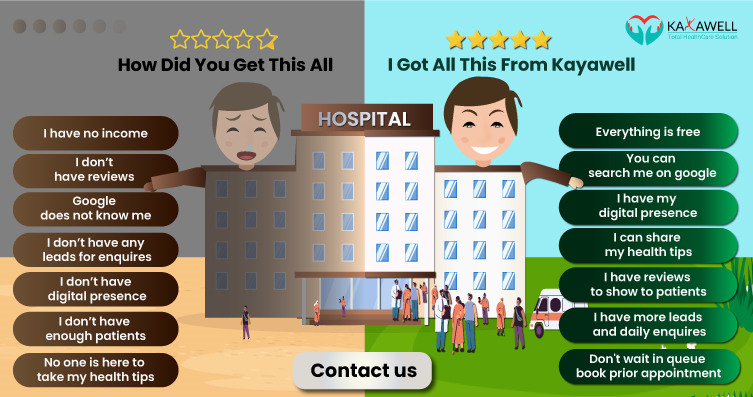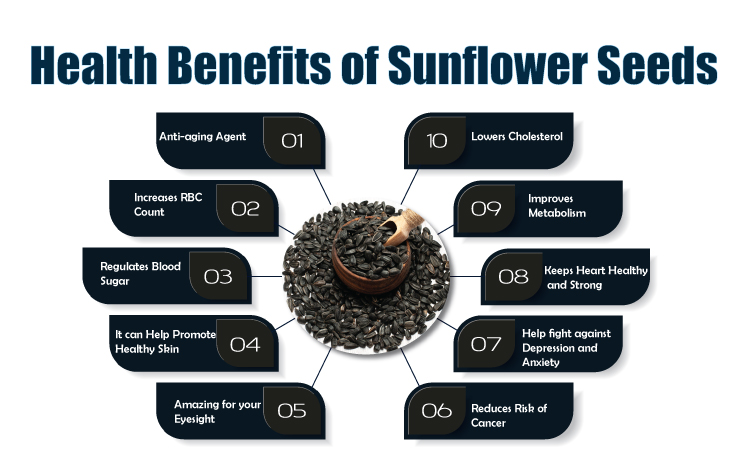Sunflower seeds contain potent antioxidants that reduce the risk of developing Cancer. Furthermore, Sunflower seeds are a rich source of plant sterol, which has natural anti-cancer properties. It restricts the internal growth and spread of cancerous tumors. It also shrinks the tumor in breast cancer patients, prevents metastasis, and decreases the growth of malignant cells. However, the same efficacy of sunflower seeds in cancer treatment is still a matter of extensive research, and the claims are not backed by scientific evidence.

Risk and Side Effects of Sunflower Seeds
While the health benefits of sunflower seeds are undoubtedly awe-inspiring, there are also downsides to eating them.
● May Cause Weight-gain:
Eating sunflower seeds, especially in large quantities, puts you at significant risk of obesity and all associated risks such as diabetes, heart disease, foot problems (like plantar fasciitis)
● Impact Digestive Tract:
Eating unshelled sunflower seeds is dangerous. The shell can pierce the digestive tract.
● Allergic Reactions:
Some people may also experience an allergic reaction after eating sunflower seeds. Immediate symptoms may include diarrhea, fever, and stomach cramps.
● Increase Unhealthy Cholesterol:
They are also a source of saturated fatty acids, and excess can lead to unhealthy LDL or LDL cholesterol levels high.
● Effect Liver Health:
The risk of liver carcinogens rises with excessive consumption of sunflower seeds. Choline can be found in sunflower seeds. A surplus of choline can harm liver cells and cause damage in the worst case.
How to Eat Sunflower Seeds
While it's easy to be blinded by the health benefits of sunflower seeds, don't consume more than 30 grams (about three tablespoons) of raw seeds daily. Sunflower seeds have an oil content of between 40 and 45 percent. Especially if you are using sunflower cooking oil, be cautious and talk to your health expert once.
Eating more than 30 grams (about three tablespoons) of raw sunflower seeds is not good. If you're going to eat it raw, run your tongue along the salty shell, break it between your teeth, and spit the shell out before you chew the seed.
Sunflower seeds have a nutty flavor. So not everyone like the flavor of raw sunflower seeds. You don't have to be disappointed as the flavor pairs well with many different dishes.
● Use them as topping for salads, soups, and sandwiches.
● Use them as a thickener for soups to create a creamy texture in sauces and dips.
● Sprinkle them on roasted vegetables or baked potatoes.
● Use them as a tasty addition to oatmeal or a bowl of warm porridge.
● They also go well with baked goods, granola bars, and even certain types of cookies and cakes.
Conclusion
Sunflower seeds are a superfood that goes with almost any meal. They're loaded with vitamins and minerals that help keep the body healthy and promote skin health. They are also fiber-rich and can help keep you full for longer.
To get the most out of sunflower seeds' health benefits, purchase them raw and with no salt added. You can enjoy them in many different ways: Try adding them to your next salad, or roast them and sprinkle them over your next bowl of pasta, or make your homemade trail mix!
We at Kayawell are committed to bringing the best from the world of health tips, news, expert advice, and more. For more informative health content, please scroll through our blog section. And if you need to talk to an expert dietician or nutritionist, Kayawell helps you with that.
Use our platform to connect with the best health experts near you. Search by specialty, experience, ratings, consultation time, and more using advanced filter search options.



 Contact Us
Contact Us






 Hospitals
Hospitals
 Doctors
Doctors
 Diagnostic
Diagnostic
 Pharmacy
Pharmacy
 Health Tips
Health Tips
 Blog
Blog



















Comments